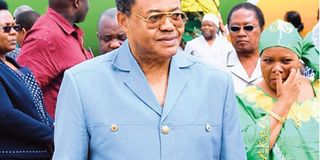Salmin’s landslide victory in 1990 polls

What you need to know:
- Dr Salmin Amour, 48, was declared Zanzibar’s new president after winning 97.74 percent of all votes cast. He scooped 193,227 votes of YES
Dar es Salaam. Zanzibar’s presidential election was held on October 21, 1990 and results were announced on October 24.
Dr Salmin Amour, 48, was declared Zanzibar’s new president after winning 97.74 percent of all votes cast. He scooped 193,227 votes of YES.
Of 214,469 voters, 4,478 cast votes of NO whilst 12,892 voters did not turn up to vote as 3,874 votes were spoiled.
The chairman of Zanzibar’s Electoral Commission, Mr Ali Khamis Abdullah, who doubled as the Speaker of the House of Representatives, said as per the voting statistics of Zanzibar’s Electoral Commission, 168,872 residents registered to vote in Unguja.
Of the number, 9,097 did not cast their votes as 159,775 voters turned up to vote. Zanzibar’s election assistant director was Ali Shariff Mussa.
The number of voters, who cast votes of YES for Dr Salmin in Unguja was 153,197 while 3,403 voters cast votes of NO. At least 3,175 votes were spoiled as 97.83 percent of votes cast on the Unguja Island accepted him.
The number of registered voters on the Pemba Island was 45,597, whereby 41,801 cast their votes. At least 696 votes were spoiled on the Island, where 3,795 voters did not turn up to vote.
The number of voters, who cast votes of YES in Pemba was 40,030, equivalent to 97.38 per cent of all registered voters. At least 1,075 voters cast votes of NO.
Dr Amour, who is a PhD holder in Economics, was elected the Fifth Phase President of Zanzibar since the Zanzibar Revolution that occurred on January 12, 1964 and removed the Sultanate of Zanzibar.
He succeeded Idris Abdul Wakil, who decided not to seek re-election in Zanzibar’s presidential and House of Representatives elections.
Then followed a swearing in ceremony schedule.
The schedule showed that all national leaders from the party and the government, including CCM retired chairman Mwalimu Julius Nyerere and former Zanzibar president Aboud Jumbe, would attend Dr Salmin’s swearing-in.
Dr Salmin was sworn-in as Zanzibar’s President and Chairman of the Revolutionary Council at 10am on October 25 at the Amaan Stadium in Zanzibar.
“I, Salmin Amour, swear to the Name of God Almighty that I shall be faithful to Zanzibar, being part of the United Republic of Tanzania and serve it with all my heart. I shall preserve, protect, respect and implement the Constitution of Zanzibar and its people according to the laws instituted. So help me God,” Those were the words uttered by Dr Salmin in his oath of allegiance.
Dr Salmin was sworn-in by Zanzibar’s Chief Justice, Hamid Mahamoud Hamid.
Shortly after being sworn-in, Dr Salmin was handed with Zanzibar’s 1984 Constitution and a copy of the 1990 General Election policy by Idris Abdul Wakil as a sign of officially handing over power to Dr Salmin to lead Zanzibar.
Dr Salmin’s oath of allegiance was followed by prayers of wishing well the new president.
The prayers were presided over by religious leaders of Muslim and the Christian denominations. The latter being represented by Anglicans and Catholics.
Zanzibar’s Chief Kadhi, Sheikh Ameri Tajo, was the first to offer prayers followed by Anglican Church Padre Paul Haddy and finally Padre Cosmas Shayo from the Catholic Church.
Hardly a day after being sworn-in, Dr Salmin appointed Dr Omar Ali Juma to become Zanzibar’s Chief Minister, whom he also appointed a member of the Revolutionary Council.
Dr Omar, who, by profession, was a veterinarian, was appointed Chief Minister for the first time in January 1988 by Zanzibar’s former president, Idris Abdul Wakil.
According to Zanzibar’s Constitution, after president taking power, he is required to appoint a Chief Minister, whom he will later consult to form the Cabinet of Ministers.
Dr Omar was a member of the House of Representatives for Wawi Constituency in Chake Chake District, Pemba South Region. During the October 21, 1990 House of Representatives polls, Dr Omar sailed through unopposed.
Two days after appointing Dr Omar, President Salmin nominated seven people as members of the House of Representatives.
Those nominated included Said Iddi Bavuai, Said Bakari Jecha, Idd Pandu Hassan, Omar Ramadhani Mapuri, Isaac Abraham Sepetu, Abdulrahman Mwinyi and Major General Bakari Wakati.
Among those nominated were three ministers from the Cabinet that ended its tenure with one ambassador. Sepetu was Tanzania’s Ambassador to Zaire (now DR-Congo).
The three ministers were nominated members of the House of Representatives as Iddi, Mapuri and Bavuai did not seek re-election in the 1985 polls.
Iddi was minister of State in the President’s Office (Regional Administration and Zanzibar Revolutionary Government Special Forces); Mapuri was minister of State in the Chief Minister’s Office and Bavuai was minister without portfolio.
Jecha was minister of State in the Chief Minister’s Office until 1988 when he quit and went to the UK for studies. Bakari Wakati was Major General for the 20th Division of the Tanzania People’s Defence Force and Abraham Mwinyi was a members the House of Representatives for Chambani Constituency in Pemba before the October 21 General Election in which he did not contest.
Zanzibar’s 1984 Constitution authorised President of Zanzibar, who doubles as the chairman of the Revolutionary Council to nominate 10 members of the House of Representatives.
The first sitting of the House of Representatives began on October 30 to pick its Speaker, who was Ali Khamis Abdullah, who contested for that position again.
On October 30, Dr Salmin announced his Cabinet in which he appointed new five ministers, leaving out three former ministers.
The new appointed ministers were Amina Salum Ali (Finance), Issac Sepetu (minister of State in the President’s Office, Planning); Aman Abeid Karume (Trade, Industry and Marketing); Salum Hashim Rajab (Water, Works, Energy, Land and Environment) and Said Bakari Jecha (minister of State in the Chief Minister’s Office).
The ministers left out include Jaffar Mfaume Ali (Finance), Mohammed Abdalla Khamis (Water, Works and Energy) and Mohammed Mwinyi Mzale (Education).
Amina was minister of State in the Finance ministry of the United Republic Government while Saidi Bakari Jecha was the president’s adviser on regional administration.
In the Cabinet, the president dissolved one ministry, whose activities were shifted to other ministries. The ministry dissolved was that of Cooperatives, Marketing, Land Commission and Environment.
The full Cabinet was made up of Dr Omar Ali Juma (Chief Minister); Iddi Pandu Hassan (minister of State in the President’s Office, Regional Administration and Special Forces of Zanzibar Revolutionary Government); Taimour Saleh Juma (minister of State in the President’s Office, Special Task) and Omar Ramadhani Mapuri (Education).
The others in the Cabinet are Seif Rashid Seif (Agriculture, Livestock and Natural Resources); Rufeya Juma Mbarouk (Communications and Transport); Ramadhan Abdallah Shaaban (Information, Culture, Tourism and Youth); Dr Msim Abdulrahman Hassan (Health and Coordination).
Issac Sepetu (minister of State in the President’s Office, Planning); Amina Salum Ali (Finance); Salum Hashim Rajab (Water, Works, Energy, Land and Environment) and Aman Abeid Karume (Trade, Industry and Marketing).
The ministers, together with their colleagues with no portfolios, were the ones who formed the Revolutionary Council that consisted 18 members.
The ministers with no portfolios included Ali Ameir Mohamed, Major General Bakari Wakati, Said Idd Bavuai, Ali Mohammed Shoka, Abdullah Salim Mugheiry and Adam Mwakanjuki. They were sworn-in Wednesday on October 31, 1990.



